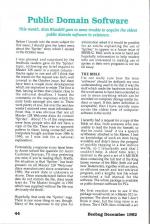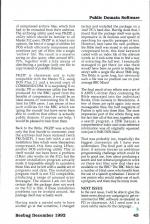
Beebug
 1st December 1992
1st December 1992
Author: Alan Blundell
Published in Beebug Volume 11 Number 7
This month, Alan Blundell goes to some trouble to acquire the oldest public domain software in existence.
Public Domain Software
Before I launch into the main subject for this issue, I should give the latest news about the 'Spriter' story which I related in the October issue.
I was pleased and surprised by the feedback readers gave on the 'Spriter' topic, following my brief request to Master 128 users in a recent column - thanks again to one and all! I think that the reason for the request was fairly well covered in the October issue, but there have been a couple more developments which are important to relate. The first is that, having written that column close to the editorial deadline, I based the comments on the responses which the early birds amongst you sent in. There were plenty of you, but over the next few weeks I received even more information.
From this, it was obvious that not all Master 128 Welcome discs do contain 'Spriter'. About 1% of the responses were from people who did not have a copy of the file. There was no apparent pattern to them, being connected with computers bought anytime from 1986 to 1990, so I was lost for a rational explanation.
Fortunately, a response to my latest letter to Acorn solved the question (to Acorn Customer Services, I'll stop pestering you now, if you're reading this!). Briefly, the situation is that 'Spriter' has been present on all Master 128 'Welcome' discs manufactured since sometime in 1986; the exact date is unknown to Acorn. Discs manufactured before that date do not contain the file, discs made later do. The Master bought in 1990 which was supplied without the file was obviously old stock!
Hopefully, that ends the 'Spriter' saga. There is one more thing to say, though. Many of the responses to my plea for information asked if it would be possible for an article explaining the use of 'Spriter' to appear in a future issue of Beebug. Well, work is now in hand and hopefully information to help readers who are interested in making use of sprites in their own programs is not too far away.
The Bible
I'm not really sure how the term 'software' should be defined; my own understanding used to be that it was the stuff which made the hardware work but the word seems to have been extended in use to mean anything which can be recorded on computer storage media (i.e. discs or tape). If this latter definition is acceptable, then I have recently come across the oldest item of computer software in the world.
I recently had a request for a copy of the Bible on disc, from someone who was unable to read the book for himself, so that he could 'read' it via a speech synthesiser attached to his Master. I had no knowledge of such an item being available and didn't fancy the prospect of quickly tapping in a few million words, so I reluctantly said that I couldn't help. A short time later, I received in the post a set of 6 MS-DOS discs containing the full text of the King James version of the Bible (both old and new Testaments), together with an index, an efficient search and text retrieval program, and a lengthy text file which constituted a full manual for the software. The whole package is available as public domain software for PCs.
My first reaction was to see if the package would work on a Master 512 co-processor. The short story is that I don't think it does, but the long story is as follows. The 6 DOS discs contained a set of compressed archive files, which first had to be extracted from their archives. The archiving utility used was PKZIP, a utility which should be familiar to all Master 512 users. PKZIP is, at least in my opinion, the best of a range of utilities for DOS which efficiently compresses and combines any set of files into a single 'archive' file. The result is a massive saving on disc space, often around 60%-70%, together with a tidy means of distributing a package (only one file to copy instead of possibly dozens).
PKZIP is shareware and is fully compatible with the Master 512, using DOS Plus 2.1 and a second copy of COMMAND.COM. 1t is surprising if no similar PD or shareware utility has been produced for the BBC; apart from the benefits of compression, it would be an ideal means of overcoming the 31 file limit for DFS users. I am aware of two such utilities for the BBC which are 'going the rounds' but have never been able to confirm that either is actually public domain. If anyone can help, I would be pleased to hear from them.
Back to the Bible. PKZIP was actually only the first hurdle to overcome; once the archives had been restored (with PKUNZIP), I was left with a set of installation files which were themselves compressed, this time using LHarc, another DOS archiving utility. This in itself would not have been a problem (LHarc also works on the 512), but the arcane installation program actually made it impossible simply to unarchive those files and be left with a usable set of programs and data. The installation program itself is not 512 compatible, producing a range of unusual error messages. The reason I am not fully certain that the package does not work on the 512 is that, if these installation problems can be worked around, the package itself may actually work.
Having made a mental note to have another go at that sometime, I changed tactics and installed the package on a 'real' PC's hard disc. Having done that, I found that the package itself was quite impressive in its features and speed of searching for specific passages of text. However, here came the next problem; the Bible itself was stored in yet another compressed form, this time keyword coded with an index file of the relevant words, so it took some time to find a way of extracting the full text. I eventually managed to get there (or else there would have been no point in telling the story) with a single file about 5Mb long. The Bible is quite long, but obviously such a file was no practical use on your average BBC Micro!
The final result of my efforts was a set of 8 ADFS L-format discs containing the Bible separated into the individual Books, from Genesis to Revelations. A few of these are split again into more manageable files; the half megabyte of Psalms is split into three files. The most impressive part of the whole thing was the fact that all of this text, together with a search program, a 150K manual, a comprehensive index and cross-reference information was all originally squeezed onto just 6 360K DOS discs!
That was probably (no, hopefully) the biggest conversion job I have ever undertaken. The final part is still not done: if anyone fancies an ambitious programming challenge which could be put to good use, how about producing a search and text retrieval program to work on these text files now that they are available on the BBC? The BBC Micro has a number of blind users who benefit from the use of a speech synthesiser. I know of one person who would make use of such a program, and there may be many more.
Next Issue
In the next issue, I will be able to give the latest news about my campaign to get ex-commercial BBC software re-released as PD or shareware. All I need now is a more catchy name for the campaign...
This article was converted to a web page from the following pages of Beebug Volume 11 Number 7.



